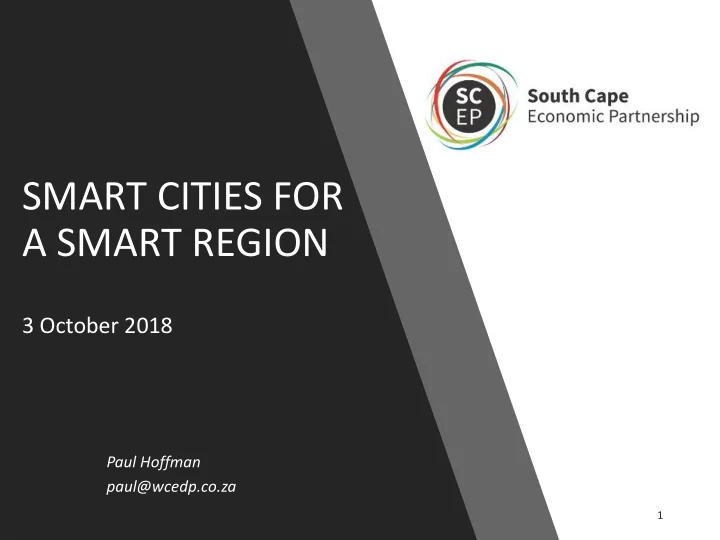

SMART CITIES FOR A SMART REGION 3 October 2018 Paul Hoffman paul@wcedp.co.za
GROWTH SECTORS IN THE GARDEN ROUTE Tourism & Oil & Gas (green fuels), Creative industry Agri-processing Waste management energy and water. Timber Industry Integrated ICT and Smart Cities transport and infrastructure 2
PATHWAYS TO A SMART REGION • Cities are complex, not complicated: – Complicated problem is unpacked, solved in pieces and aggregated for a broad systems engineering solution – Complex problems change when you engage with them… • Pathways to a Smart Region – Open data vs locked-in – Political leadership vs technical leadership – Incubators, labs and innovative procurement – Responsive and adaptive government – Act on inequality risks 3
PATHWAYS TO A SMART REGION • Many interests converge – Innovation, entrepreneurship and commercial – Government solution finding – greater effectiveness in state services • Improve local government, increase trust – Citizen-centric - Social audits – Media changes • Open Data Forum – Business cluster – unblock routes from data to commercialisation – Democracy cluster – fostering transparency, trust and responsiveness – Academic cluster – research, own data portals and skills development – Digital system cluster – improving data systems – wifi, broadband etc. 4
WHAT IS YOUR UNDERSTANDING? 5
WHO SHOULD BE ON YOUR TEAM 6
7
8
Paul Hoffman paul@wcedp.co.za
BUILDING SMART CITIES IN A SMART REGION Plettenberg Bay, October 2018 Understanding the Smart City landscape: evolution of a potentially powerful idea Nancy Odendaal University of Cape Town �
Debunking the myth
Beyond technological determinism • Objectification of technology not helpful • Technology does not constrain or liberate by itself, but • Is enrolled into socio- technical processes that are highly contextual • One technology does not simply ‘replace’ others but co- exists with ‘analog’ and digital strategies
Emancipatory potential of technology • Economic empowerment in Africa • Appropriation by marginalised groups • New spatial configurations that interface with informality • Survival strategies in conflict situations
Livelihoods and technology • The presence of technology does not imply appropriation • Localised use can lead to innovation, but relates to livelihoods • The relationship between livelihoods and technology is deeply contextual
So what is a smart city / region?
This is not it…
Smart city is not ‘new’ Wired City City of Bits Smart Sentient Virtual urbanism city city Telecity Informational city Digital city Ubiquitous City Smart city (late 1990s – early 2000s) Willis & Aurigi, 2018
Definitions • Normally the parameters are defined by how the domain of computing spills out into society and everyday life • No clear definition • Definitions superseded by new wave of technology and what the implications for cities are • Underpinning is changing role of digital and technology in society and in space
Technology-driven Smart City v. 02 • Internet of things + Big data = emphasis on data • Business agendas versus the public interest • Broadened access to technology choices • Focus on technology as leader in addressing normative concerns (climate change for e.g.)
An uncertain future… • Global climate change impacts • Political mavericks • Fake news • Migration and flight • Surveillance • Securitization
Technologies of control • Technologies of governance that range from overt force to more insidious forms of surveillance • The desire to ‘start over’ elsewhere • The ‘control room’ and the need for data integration • Smart infrastructure
The ‘City in a Box’ • Packaged solutions • The template city • The self-regulating integrated city • Integrated solutions - plug-in places • In the African context: the orderly, connected and clean city
Versus the ‘real’ city • Contingency • Informality • Emergence • Weak state • Uneven technological infrastructure
Tensions • The political project of 'masking' • Digital (political) distractions • Limited contextual engagement • Big data - big delivery • Little space for interrogating marginal spaces • Rise in digitally enabled activism
Questions? Nancy.Odendaal@uct.ac.za
Recommend
More recommend